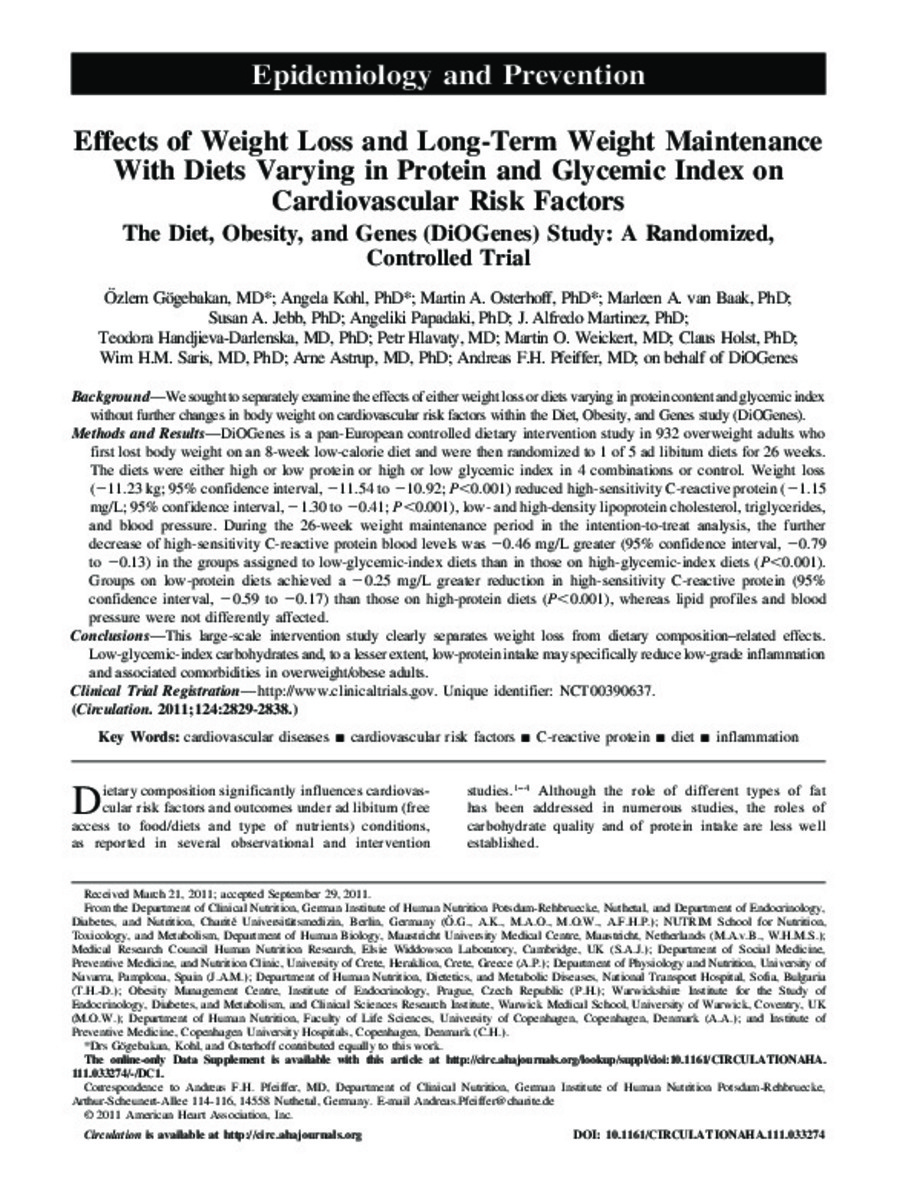Full metadata record
| DC Field | Value | Language |
|---|---|---|
| dc.creator | Gögebakan, O. (Ozlem ) | - |
| dc.creator | Kohl, A. (Angela) | - |
| dc.creator | Osterhoff, M.A. (Martin A.) | - |
| dc.creator | Van-Baak, M.A. (M.A.) | - |
| dc.creator | Jebb, S.A. (Susan A.) | - |
| dc.creator | Papadaki, A. (Angeliki) | - |
| dc.creator | Handjieva-Darlenska, T. (Teodora) | - |
| dc.creator | Hlavaty, P. (P.) | - |
| dc.creator | Weickert, M.O. | - |
| dc.creator | Holst, C. (C.) | - |
| dc.creator | Saris, W.H.M. (Wim H. M.) | - |
| dc.creator | Astrup, A. (Arne) | - |
| dc.creator | Pfeiffer, A.F. (A.F.) | - |
| dc.date.accessioned | 2013-04-07T11:30:04Z | - |
| dc.date.available | 2013-04-07T11:30:04Z | - |
| dc.date.issued | 2011 | - |
| dc.identifier.citation | Gogebakan O, Kohl A, Osterhoff MA, van Baak MA, Jebb SA, Papadaki A, et al. Effects of weight loss and long-term weight maintenance with diets varying in protein and glycemic index on cardiovascular risk factors: the diet, obesity, and genes (DiOGenes) study: a randomized, controlled trial. Circulation 2011 Dec 20;124(25):2829-2838 | es_ES |
| dc.identifier.issn | 0009-7322 | - |
| dc.identifier.uri | https://hdl.handle.net/10171/28218 | - |
| dc.description.abstract | BACKGROUND: We sought to separately examine the effects of either weight loss or diets varying in protein content and glycemic index without further changes in body weight on cardiovascular risk factors within the Diet, Obesity, and Genes study (DiOGenes). METHODS AND RESULTS: DiOGenes is a pan-European controlled dietary intervention study in 932 overweight adults who first lost body weight on an 8-week low-calorie diet and were then randomized to 1 of 5 ad libitum diets for 26 weeks. The diets were either high or low protein or high or low glycemic index in 4 combinations or control. Weight loss (-11.23 kg; 95% confidence interval, -11.54 to -10.92; P<0.001) reduced high-sensitivity C-reactive protein (-1.15 mg/L; 95% confidence interval, -1.30 to -0.41; P<0.001), low- and high-density lipoprotein cholesterol, triglycerides, and blood pressure. During the 26-week weight maintenance period in the intention-to-treat analysis, the further decrease of high-sensitivity C-reactive protein blood levels was -0.46 mg/L greater (95% confidence interval, -0.79 to -0.13) in the groups assigned to low-glycemic-index diets than in those on high-glycemic-index diets (P<0.001). Groups on low-protein diets achieved a -0.25 mg/L greater reduction in high-sensitivity C-reactive protein (95% confidence interval, -0.59 to -0.17) than those on high-protein diets (P<0.001), whereas lipid profiles and blood pressure were not differently affected. CONCLUSIONS: This large-scale intervention study clearly separates weight loss from dietary composition-related effects. Low-glycemic-index carbohydrates and, to a lesser extent, low-protein intake may specifically reduce low-grade inflammation and associated comorbidities in overweight/obese adults. | es_ES |
| dc.language.iso | eng | es_ES |
| dc.publisher | American Heart Association | es_ES |
| dc.rights | info:eu-repo/semantics/openAccess | es_ES |
| dc.subject | Cardiovascular diseases | es_ES |
| dc.subject | Cardiovascular risk factors | es_ES |
| dc.subject | C-reactive protein | es_ES |
| dc.subject | Diet | es_ES |
| dc.subject | Inflammation | es_ES |
| dc.subject | DiOGenes | es_ES |
| dc.title | Effects of weight loss and long-term weight maintenance with diets varying in protein and glycemic index on cardiovascular risk factors: the diet, obesity, and genes (DiOGenes) study: a randomized, controlled trial | es_ES |
| dc.type | info:eu-repo/semantics/article | es_ES |
| dc.type.driver | info:eu-repo/semantics/article | es_ES |
| dc.identifier.doi | http://dx.doi.org/10.1161/CIRCULATIONAHA.111.033274 | es_ES |
Files in This Item:
Statistics and impact
Items in Dadun are protected by copyright, with all rights reserved, unless otherwise indicated.






